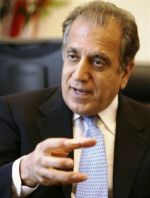Security Council drops urgent peacekeeping appeal to Sudan
May 25, 2007 (UNITED NATIONS) — The U.N. Security Council dropped an appeal Friday urging Sudan to quickly allow a robust peacekeeping force in violence-wracked Darfur, approving instead a watered-down statement that took the focus off the Sudanese government.

The A.U. and U.N. proposed Thursday tripling the number of peacekeepers in Darfur with the force of at least 23,000 soldiers and police allowed to launch pre-emptive attacks to stop violence.
But after lengthy discussions among council experts and ambassadors Friday, the council eliminated all references to the Sudanese government, which has not given a green light to the deployment of the hybrid force.
The presidential statement, read at a formal meeting by U.S. Ambassador Zalmay Khalilzad, the current council president, demanded that all parties “meet their international obligations.”
The change was a clear indication of the continuing international discord over how best to halt the ongoing bloodshed in Darfur. The negotiations on the presidential statement were held behind closed doors and council diplomats said there were some objections to pressuring the Khartoum government directly. While some countries are concerned that pressure could backfire, others have been accused of protecting Sudan, for a variety of reasons including their own economic and political interests.
Secretary-General Ban Ki-moon met Sudan’s U.N. Ambassador Abdelmahmood Abdelhaleem on Friday morning and handed him a copy of the report. Abdelhaleem told reporters later that his government would study it.
Despite the changes, Khalilzad called Friday’s statement, “a good statement that not only welcomed this development but also called on the parties concerned, including the government of Sudan to observe its obligations.”
He then read the key sentence from the statement, which says: “The Security Council further demands that all parties meet their international obligations; support the political process; end violence against civilians and attacks on peacekeepers; and facilitate humanitarian relief.”
The four-year conflict between ethnic African rebels and pro-government janjaweed militia in the vast western Darfur region has killed more than 200,000 people and displaced 2.5 million Darfurians. The beleaguered, 7,000-strong African Union force has been unable to stop the fighting, and Sudan’s President Omar Al-Bashir has stalled implementation of the hybrid force – the last part of a three-phase U.N. plan to back up the African troops.
In Friday’s statement, the council called for “full implementation without delay” of the first two phases – a light support package including U.N. police advisers, civilian staff and additional resources and technical support, and a heavy support package with 3,000 U.N. troops, police and civilian personnel along with six attack helicopters and other equipment.
When Khalilzad read the presidential statement the first time, it included a demand for all parties to “abide by the cease-fire, including the cessation of aerial bombardment.” The U.S. had proposed this language but it had been dropped in the final text and Russia’s U.N. Ambassador Vitaly Churkin could be seen on in-house television getting up, apparently to protest.
After about 15 minutes, Khalilzad called a second council meeting and read the correct statement.
Council diplomats said he was handed the wrong statement to read. “It was late in the day, Friday, administration under a degree of stress – but you know, we’re all human beings. It happens,” Khalilzad said afterwards.
“We remain concerned about ongoing aerial bombardment of targets in Darfur,” the U.S. ambassador said. “We remain concerned about the fact that the janjaweed have not been disarmed yet.”
(AP)
